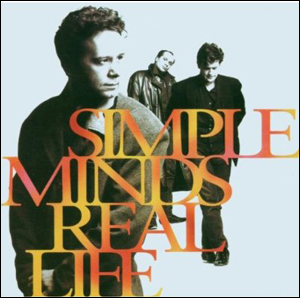There’s a curious waiting game that you play, as a fan, following a band you have loved in the knowledge that their best work is already behind them. They may still be putting out albums, may even still be turning out the occasional great song, maybe even the occasional masterpieces; but those masterpieces will be strewn about like diamonds in a brickyard, amidst plenty of filler, and nothing will hang together the way it did when they were on their hot streak. (I’ve got kind of a half-assed theory, on which I may expand another time, that any given recording artist or band has, at most, five Great Albums in them.) And you, as a fan, will keep buying the albums, but you no longer look forward to them, exactly. Because even as you hope for the best, you know that — unless you are a sad completist — each new album represents a decision point; any album may be the one that makes you think: This is it. We have reached the point of diminishing returns, and this is the last of this product that I shall buy.
 For me, with Simple Minds, Real Life marked that point. For five albums, from 1980’s Empires and Dance to 1984’s Sparkle in the Rain, the boys from Glasgow managed a fusion of high romance and robot funk, European sophistication and a wicked low end. It was art-rock you could dance to, and it was too good to last. After the one-off commercial breakthrough of ”Don’t You (Forget About Me),” the Minds followed up with 1985’s Once Upon a Time, which is about three-quarters of a great record. A long period of redirection produced 1989’s Street Fighting Years, which starts off strongly and goes disastrously off the rails about two-thirds of the way through. The ratios were skewing in the wrong direction. The trajectory was clear. I was quite conscious, when purchasing Real Life, that it represented a sort of last chance at a turnaround.
For me, with Simple Minds, Real Life marked that point. For five albums, from 1980’s Empires and Dance to 1984’s Sparkle in the Rain, the boys from Glasgow managed a fusion of high romance and robot funk, European sophistication and a wicked low end. It was art-rock you could dance to, and it was too good to last. After the one-off commercial breakthrough of ”Don’t You (Forget About Me),” the Minds followed up with 1985’s Once Upon a Time, which is about three-quarters of a great record. A long period of redirection produced 1989’s Street Fighting Years, which starts off strongly and goes disastrously off the rails about two-thirds of the way through. The ratios were skewing in the wrong direction. The trajectory was clear. I was quite conscious, when purchasing Real Life, that it represented a sort of last chance at a turnaround.
It wasn’t. And I think it’s worth looking at why it wasn’t, and at how we got here. The first thing to remember is that, due to the structure of the entertainment industry, most acts spend most of their career in decline. People start bands when they’re young; because the industry is so competitive, bands blow up early on or they never get the chance to blow up at all; and for those who do achieve success, there are massive social and lifestyle disincentives against retiring or quitting the business. So the career mode is to peak before age thirty, and mark your remaining time while waiting for death in managing your legacy.
That’s a hard pill to swallow — no one wants to believe that their best work is already in the past — so bands go to all kinds of lengths to convince themselves that it’s not so, and that the work they’re doing right now is just as relevant as their earlier stuff; and in so doing, they get caught up in all kinds of snares and pitfalls that, ironically, guarantee that the newer work will never be as good as the older. The relevancy trap in which main Mind Jim Kerr ensnared the band was topicality.
Kerr got it into his head that Simple Minds could remain an ”important” group by ”taking on” the big issues of the day. There had always been a social conscience at play in Simple Minds, of course, but it had always expressed itself obliquely, Now, though, Kerr wanted to go full-on in the manner of his friends in U2, and address politics directly his writing — despite a constitutional inability to convincingly do so.
Lyrically, Kerr had always favored sweep over substance; but the glorious abstractions of the early work were the wrong tools for the topical direction he’s chosen. Critic Tom Ewing, in his very savvy take on the Minds’ 1989 single ”Belfast Child” (and incidentally, if you aren’t reading Tom’s blog Popular, in which he aims to analyze every British #1 single in order, then you’re missing out on some brilliant and hugely ambitious writing, as well as one of the liveliest comments sections on the Web) notes that Kerr confuses mere vehemence for insight, and presents the good intentions of ”raising awareness” of an issue as a workable substitute for actually having something to say about that issue. It isn’t.
With that in mind, look at the song titles on Real Life. ”Woman.” ”Let the Children Speak.” There’s one called ”African Skies,” fa chrissakes. This is a tracklisting to inspire dread.
From the opening title cut, though, it’s clear the Kerr thinks he’s found a workaround. Lacking a lyrical style suited to tackling the Problems We All Face Today©, he adopts a very rock n’ roll solution: he steals a style wholesale from another, more successful artist. Vaporous keyboards clear away, making space for a sharp nylon-string guitar riff, and then Kerr comes crashing in…
Paula came from Washington with her long golden hair,
Twenty-eight dollars in a fake silk purse, and a leather skirt to wear
Shane came from Dublin Town, from the Old World so green
Counterfeit ticket into JFK and the land of his dreams…
…and ten bucks says they’ll end up down by the river, and into the river they’ll dive.
[kml_flashembed movie="http://www.youtube.com/v/64jSC16s_a0" width="600" height="485" allowfullscreen="true" fvars="fs=1" /]
The problem with the Springsteenian everyman approach is that it cannot work without a solid grounding in detail and/or a generous dash of irony, and Kerr comes up short in both arenas. He’s good with atmospheres, but he has no hand for narrative. Paula and Shane never feel real, even for a moment; he shoves them onto the stage, shouting ”Look upon them! They are regular people, and they’ve got regular-people problems, just like you, the listener!” But he gives them nothing to do; they stand there behind the footlights, muttering banalities and waving awkwardly, and after a while the curtain falls and no one is any the wiser.
It is revealing, though, that ”Real Life” is set in New York City. Again following U2’s lead, Simple Minds is discovering America and hoping the Joshua Tree-sized sales numbers follow. The prominent backing vocals are the first clue; although Simple Minds had set Kerr’s white-boy yelp against a more soulful counterpoint before, with African-American songstress Robin Clark acting as de facto co-lead vocalist on Once Upon A Time, here he’s surrounded by a gospel choir that threatens to drown him out.

Guitarist Charlie Burchill is writing all the music here. He’s playing a lot of slide — perhaps the clearest evidence of the Americanization of Simple Minds’ sound — and has developed a unique and appealing voice on the instrument, exploring its textural possibilities without resorting to blues clichÁ©s. But he’s missing the lightening touch of longtime keyboard foil Mick MacNeil, who was always good for either heartbreak piano or frosty Kraftwerk sequencers. When the album does invoke MacNeil’s legacy, it immediately undercuts it. The prospect of a late-period Simple Minds song called ”Let the Children Speak” (download) is dreadful enough; but when the music for said song proves to be a shameless reworking of the well-loved Sister Feelings Call-era instrumental ”Theme for Great Cities” (download), it only adds insult to injury.
There are some gems amidst the rubble, some of which find the band playing old tricks, others new. Of the former, ”See the Lights” is the most likeable; with its fizzy keys and a swooping bassline that evokes departed founding member Derek Forbes, it hearkens back to the epic meaninglessness of classic Minds, all longing and mood, woo-woo-girls notwithstanding.
[kml_flashembed movie="http://www.youtube.com/v/kLNM9drx6Rc" width="600" height="485" allowfullscreen="true" fvars="fs=1" /]
For the latter, a couple of tracks on Real Life find Kerr trying on a bluesy loverman persona — always a dicey proposition for a band that had generally shied away from outright carnality; but while the stonking ”Traveling Man” lands on the wrong side of obnoxious, ”Stand By Love” finds the right balance of playfulness and passion.
[kml_flashembed movie="http://www.youtube.com/v/quk16Q2CZDA" width="600" height="485" allowfullscreen="true" fvars="fs=1" /]
But it’s not enough. No one, not even the most diehard Simple Minds fan, was expecting Real Life to be a perfect album; those are so rare as to come once in a career, if at all, and almost never after the sort of personnel shake-ups the group had suffered. But it’s in the nature of the fan to keep hoping for another capital-G Great Album, an album that takes you somewhere and holds you there for the duration. Not every song on a Great Album will necessarily be a great song, but none will leave you scratching your head or checking your watch. But there are songs on Real Life that leave me doing both, wondering how such a good band could forget its strengths so thoroughly and lose its way so badly, and knowing, as sure as eggs is eggs, that they were never going to find their way back intact. As a fan, you’re always hoping that the band you have loved will buck the Rule of Five; but fandom provides its own kind of perspective, and it’s a perspective that the bands themselves can never have — one that allows you to recognize when the game is over.





Comments